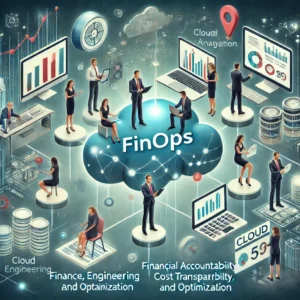Contents
- 1
- 2 Introduction to FinOps
- 3 The Core Principles of FinOps
- 4 Key Components of FinOps
- 5 The FinOps Lifecycle
- 6 Benefits of Implementing FinOps
- 7 Challenges in Adopting FinOps
- 8 FinOps Best Practices
- 9 Tools and Technologies for FinOps
- 10 How FinOps Differs from Traditional Financial Management
- 11 The Role of FinOps in Cloud Computing
- 12 Industry Trends and the Future of FinOps
- 13 Getting Started with FinOps
- 14 Case Studies: Successful FinOps Implementation
- 15 Conclusion
- 16 LET’S KEEP IN TOUCH!
Introduction to FinOps
In today’s cloud-driven world, managing cloud financial operations effectively is a top priority. FinOps, short for Financial Operations, is a framework that helps businesses gain financial control over their cloud usage while optimizing efficiency. Learn more about FinOps from the FinOps Foundation.
The Core Principles of FinOps
Collaboration Across Teams
FinOps fosters collaboration between finance, engineering, and business teams, ensuring a shared responsibility for cloud costs.
Financial Accountability
It promotes cost awareness by assigning responsibility for cloud expenditures to the appropriate teams.
Data-Driven Decision Making
Businesses use real-time data to track spending and make informed cost-related decisions.
Key Components of FinOps
Cloud Cost Visibility
Organizations must monitor cloud spending in real time to gain cost transparency. Explore AWS Cost Management tools.
Budgeting and Forecasting
Planning cloud budgets based on usage trends helps prevent overspending. Check Out:
Cost Optimization Strategies
Reducing unnecessary expenses through automation and waste elimination is crucial for efficiency. Read about Azure Cost Optimization.
The FinOps Lifecycle
Inform Phase
This phase involves gathering data, tracking expenditures, and setting financial goals.
Optimize Phase
Organizations identify inefficiencies and apply cost-saving strategies.
Operate Phase
The final phase focuses on continuous monitoring and automated cost control.
Benefits of Implementing FinOps
- Cost Efficiency – Enables businesses to optimize cloud expenses.
- Improved Cloud Governance – Ensures accountability and transparency.
- Scalability – Helps organizations scale while maintaining financial control.
Challenges in Adopting FinOps
- Limited Visibility – Without proper tools, tracking cloud costs can be challenging.
- Complex Pricing Models – Different cloud providers have varied and intricate cost structures.
- Organizational Resistance – Teams may resist integrating cost accountability into workflows.
FinOps Best Practices
- Cultivate a FinOps Culture – Encourage cost awareness across teams.
- Automate Cost Management – Leverage AI and analytics for efficiency.
- Conduct Regular Cost Audits – Frequent reviews ensure continuous optimization.
Tools and Technologies for FinOps
- Cloud Cost Management Platforms – AWS Cost Explorer, Google Cloud Billing, Azure Cost Management.
- Monitoring and Analytics Tools – Datadog, New Relic, Prometheus.
- AI and Automation – AI-powered cost monitoring enhances efficiency.
How FinOps Differs from Traditional Financial Management
- Real-Time Cost Monitoring – Traditional finance lacks instant spending insights.
- Cross-Team Collaboration – FinOps integrates engineering and finance efforts.
- Agile Financial Planning – Decisions are based on real-time data.
The Role of FinOps in Cloud Computing
FinOps ensures that cloud spending is optimized while supporting DevOps and engineering teams.
Industry Trends and the Future of FinOps
- AI and Machine Learning – Predictive insights enhance cloud cost management.
- New Cloud Cost Models – Emerging strategies are redefining cloud expenses.
Getting Started with FinOps
- Develop a FinOps Strategy – Set clear objectives and best practices.
- Train Teams – Equip staff with FinOps knowledge and tools.
Case Studies: Successful FinOps Implementation
Companies like Netflix and Airbnb have optimized cloud costs through FinOps, achieving significant savings. See case studies from the FinOps Foundation.
Conclusion
FinOps is a must-have for businesses leveraging cloud computing. By integrating FinOps principles, companies can achieve cost optimization, financial accountability, and improved collaboration.


